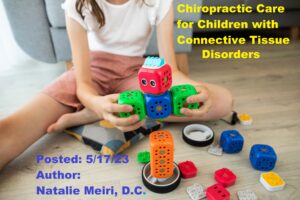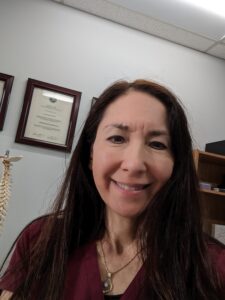
Does your child have a connective tissue disorder? This post explains what it is and how chiropractic can help.
Connective Tissue Disorders are a group of related disorders characterized by abnormal collagen (principal protein of the skin, tendons, ligaments, cartilage, bone, and connective tissue) production and structure. Although there are numerous types, they generally have three common clinical manifestations (1) hypermobile joints, (2) fragile blood vessels, and (3) various cutaneous (affecting skin) abnormalities including hyperelasticity.
Connective Tissue Disorders Have Laxity and Hypermobility
Firstly, generalized laxity (looseness of joint/ muscle) is a prominent finding in connective tissue disease. Indeed, your child will have hypermobile joints. And hypermobile joints have a greater range of motion than is expected or normal.
Secondly, the problem is the hypermobile joints are not just hypermobile, but are also unstable. In connective tissue disorders joint instability leads to joint injuries. Furthermore, Joint instability can cause both acute and chronic pain.
Thirdly, Joint hypermobility and/or instability may be a child’s only problem. This is than called joint hypermobility syndrome. Additionally, it can also occur as part of a known syndrome, such as a type of Ehlers-Danlos syndrome, Marfan syndrome, or Down syndrome. Scientists have said joint hypermobility syndrome is a milder form of Ehlers-Danlos Syndrome.

Symptoms of Connective Tissue Disorder
There is a wide variation in the type and severity of symptoms children experience with connective tissue disorders. For instance, some children may experience mild or severe joint pain. Moreover, they may also experience one, or many other symptoms such as fatigue, dizziness, constipation, or headaches. And these symptoms may be mild or severe.
A child with Ehlers-Danlos syndromes may have the eyes affected. They may have blue sclerae (outer layer of eyeball) instead of white. Also, the lungs, skin, cardiovascular, and gastrointestinal systems may be affected. Physically, the child is tall and walks with a gait of hyperextension at the hips (movement that is outside normal range of motion) and genu recurvatum/ hyperextended knees (knee is bent backward beyond its usual limit).
Diagnosis of Connective Tissue Disorders
There are currently no laboratory tests to diagnose theses genetically inherited disorders. Diagnosis is through observation of criteria, questionnaires and scoring (e.g. Beighton score).
Musculoskeletal Treatment for Children with Connective Tissue Disorders
Children with Connective Tissue Disorders may suffer acute ligament and soft tissue injury, overuse injuries, possible increases in fractures and a possible predisposition to degenerative joint disease after years of excessive joint motion. If left untreated or undiagnosed, hypermobility may result in a chronic pain cycle and high levels of disability. Nevertheless, overall maintenance of physical fitness is important for managing symptoms of connective tissue disorders.
It may seem inconsistent to apply adjustments (chiropractic manipulative therapy), a treatment intended to impart mobility to articulations, in patients with hypermobility. However, joint dysfunctions from connective tissue disorders were treated with manipulation in various research cases with positive outcomes. Of course, modification of the application of pressure and force is necessary for successful outcomes. And recovery and healing is often slower than in kids who are non-hypermobile.
Other therapies, such as soft tissue techniques, therapeutic exercise, and ice/ heat therapies may also provide some relief.

Chiropractic Care for Children with Connective Tissue Disorders in West Palm Beach
The fact is Chiropractors receive training to adjust all people, from babies to the elderly. Many children have benefited from chiropractic care, including babies.
Did you know along with adequate nutrition, sleep and physical activity, adjustments can be life changing for children? For parents who are looking for answers besides putting their kids on more drugs, Chiropractic is a great solution.
Call Meiri Chiropractic at 561-253-8984 to make an appointment or to find out more about Chiropractic Care for Children with Connective Tissue Disorders.